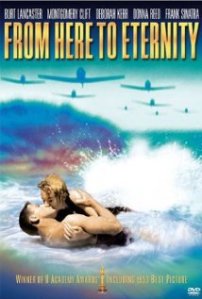Rating: 3 stars (out of 4)
From Here to Eternity (1953): Dir. Fred Zinnemann. Written by: Daniel Taradash. Based upon the novel of the same name by James Jones. Starring: Burt Lancaster, Montgomery Clift, Deborah Kerr, Donna Reed, and Frank Sinatra. Unrated. Running time: 118 minutes.
 All I really knew about this film coming in was the infamous kiss-in-the-surf scene (parodied beautifully in Airplane!). What I saw was a surprisingly affecting (if somewhat unfocused) adaptation about two peacetime soldiers in the days leading up to World War II.
All I really knew about this film coming in was the infamous kiss-in-the-surf scene (parodied beautifully in Airplane!). What I saw was a surprisingly affecting (if somewhat unfocused) adaptation about two peacetime soldiers in the days leading up to World War II.
Stocked with stars and rich with wartime nostalgia, Eternity focuses on two enlisted men stationed at Pearl Harbor on the eve of December 7, 1941. Private Prewitt finds himself abused by his fellows after refusing to join the Army boxing team. Elsewhere, Sergeant Warden decides to shack up with his commanding officer’s wife. But as circumstances escalate in their lives, Prewitt and Warden come to realize what matters most as they face the inexorable advance of war.
Much of the film’s strength comes from its acting performances—there’s nary a bad performance to be found in the principal cast. Burt Lancaster and Montgomery Clift bring a startling intensity to their roles, especially Clift as he is hazed relentlessly by his army cohorts. And Donna Reed and Deborah Kerr bring depth and nerve to their roles as women fighting for a sense of fulfillment in a man’s world.
If the film doesn’t quite offer a holistic conclusion to its various plots, it still manages some impressive standalone set-pieces. Sinatra as Private Maggio delivers comic gold when he ditches guard duty for brewskis. And indeed, the famous scene on the beach provides an interesting take on forbidden love and sex, all without showing the act itself.
While the film devolves into propaganda toward the end, it does say interesting things about what “peacetime” really means—and how warfare simplifies our focus, even as it desolates us in newfound ways. Perhaps topical for its time, it’s still a relevant film for individuals lost in the shuffle of social order.
Next film: On the Waterfront, 1954